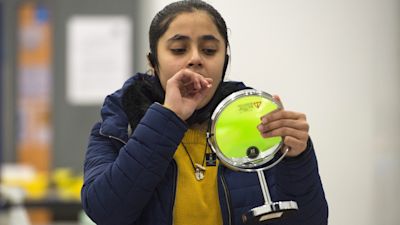Gene which doubles risk of Covid more common in people of South Asian heritage

A gene that doubles the risk of respiratory failure from Covid-19 is more common in people with South Asian ancestry.
Some 60% of people with south Asians backgrounds carry the high-risk gene, scientists at the University of Oxford have found.
They say this partly explains the higher numbers of deaths in some ethnic groups in the UK and the impact of the pandemic in south Asia.
But they stressed that they are not suggesting socio-economic factors are not important when looking at Covid risk.
The gene is also common in the European population, occurring in about 15% of people.
Researchers also found 2% of people with Afro-Caribbean ancestry carried the gene, so the findings do not completely explain the higher death rates for people in black and minority ethnic groups.
“If you have the high risk genotype and you get very unwell with Covid, there’s a 50% chance that that wouldn’t have happened to you had you had the lower risk genotype,” James Davies, an NHS doctor who co-led the study said.
But because the gene affects the lungs rather than the immune system, the increased risk "should be cancelled out by the vaccine", Prof Davies, who is also an associate professor of genomics at the University of Oxford’s Radcliffe Department of Medicine, said.
The study, published in Nature Genetics, found the gene probably prevents the cells lining airways and the lungs from responding to the coronavirus properly.
Listen to ITV News' podcast - Coronavirus: What you need to know
Prof Davies hopes treatments can be developed to target the lungs.
He said: “The genetic factor we have found explains why some people get very seriously ill after coronavirus infection.
“It shows that the way in which the lung responds to the infection is critical.
“This is important because most treatments have focussed on changing the way in which the immune system reacts to the virus.”
Previous research had identified a stretch of DNA that doubled the risk of Covid for adults under-65. But it was not known how this worked to increase the risk.
Dr Damien Downes, who led the laboratory work from the Prof Hughes research group, said: “Surprisingly, as several other genes were suspected, the data showed that a relatively unstudied gene called LZTFL1 causes the effect.”